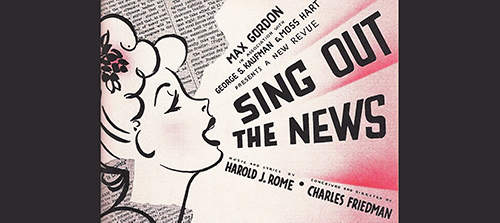Pas de biographie disponible.
Compositeur Musique additionelle Librettiste Parolier Metteur en scène Chorégraphe Producteur création Producteur version
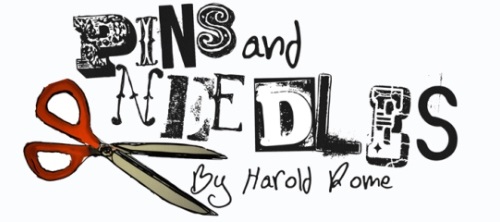
Musical
Musique: Harold Rome •
Paroles: Harold Rome •
Livret: *** Divers •
Production originale:
3 versions mentionnées
Dispo: Résumé Génèse Liste chansons
The International Ladies Garment Workers Union used the Princess Theatre in New York City as a meeting hall. The union sponsored an inexpensive revue with ILGWU workers as the cast and two pianos. Because of their factory jobs, participants could rehearse only at night and on weekends, and initial performances were presented only on Friday and Saturday nights.[1][2] The original cast was made up of cutters, basters, and sewing machine operators. Pins and Needles looked at current events from a pro-union standpoint. It was "lighthearted look at young workers in a changing society in the middle of America's most politically engaged city."[2] Skits spoofed everything from Fascist European dictators to bigots in the DAR. Word-of-mouth was so enthusiastically positive that the cast abandoned their day jobs and the production expanded to a full performance schedule of eight shows per week. New songs and skits were introduced every few months to keep the show topical. According to John Kenrick, Pins and Needles "is the only hit ever produced by a labor union, and the only time when a group of unknown non-professionals brought a successful musical to Broadway."
Genèse: Productions Originally written for a small theatrical production, the first production of Pins and Needles was directed by Samuel Roland. After a two week professional run, it was adapted for performances by members of the then-striking International Garment Workers' Union as an entertainment for its members. Because Roland was associated with left-wing causes, he was asked by ILGWU president David Dubinsky to withdraw. The better-known ILGWU production was directed by Charles Friedman and choreographed by Benjamin Zemach. It opened on November 27, 1937 at the Labor Stage Theatre and then transferred to the Windsor Theatre on January 1, 1939, finally closing on June 22, 1940 after 1108 performances. The cast included Harry Clark. The production was directed by the African-American dancer Katherine Dunham. The Roundabout Theatre Company produced a revival Off-Broadway at the Roundabout Stage 1 Theatre in 1978, which ran for 225 performances. The Jewish Repertory Theatre presented a concert in 2003, to include songs and sketches from all versions of the show. Pins and Needles was presented in the UK for the first time at the Cock Tavern Theater in Kilburn, London in November and December 2010. The production was directed by Rachel Grunwald and received positive reviews from the theatre press.
Résumé: From 1937 to 1941, Pins & Needles was a hit musical comedy revue running on Broadway. But this was no ordinary Broadway musical: It was written for and performed by members of The International Ladies Garment Workers' Union. With songs by Harold Rome, ILGWU members sang out for all the people fighting for jobs, housing, a minimum wage, immigrants' rights and economic justice, and performed sketches that satirized the European fascists and the U.S. right-wing reactionaries who rose up against FDR's New Deal.
Création: 27/11/1937 - Princess Theatre (Broadway (Off)) - représ.
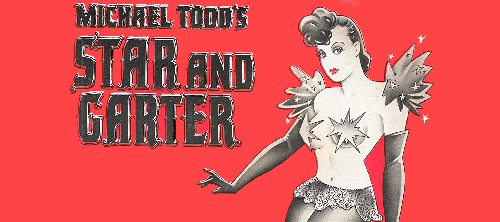
Revue
Musique: Gypsy Rose Lee • Doris Tauber • Harold Arlen • Harold Rome • Irving Berlin • Irving Gordon • Jimmy McHugh • Lester Lee • Will Irwin •
Paroles: Gypsy Rose Lee • Al Dubin • Al Stillman • Harold Rome • Irving Berlin • Irving Gordon • Jerry Seelen • Johnny Mercer • Sis Willner •
Livret:
Production originale:
1 version mentionnée
Dispo: Liste chansons
Sous la direction du maire Fiorello H. LaGuardia, le commissaire des licences de la ville de New York, Paul Moss, n’avait pas renouvelé les licences des théâtres qui présentaient des numéros de strip-tease, mais cela n’a pas empêché le producteur Michael Todd de se lancer dans le Vaudeville avec une revue somptueuse qui incorporait de vieux numéros de Burlesque avec les traditionnels strip-tease. Bien que les critiques ont mentionné que le spectacle n’était pas pour les enfants et que le deuxième acte était tout à fait (dirons-nous) révélateur, apparemment les filles ont gardé suffisamment de pastilles à mamelons pour assurer que le Music Box Theatre conserve sa licence pour les dix-huit mois prospères durant lesquels Star et Garter s'y est joué.
Genèse:
Résumé:
Création: 24/6/1942 - Music Box Theatre (Broadway) - 609 représ.
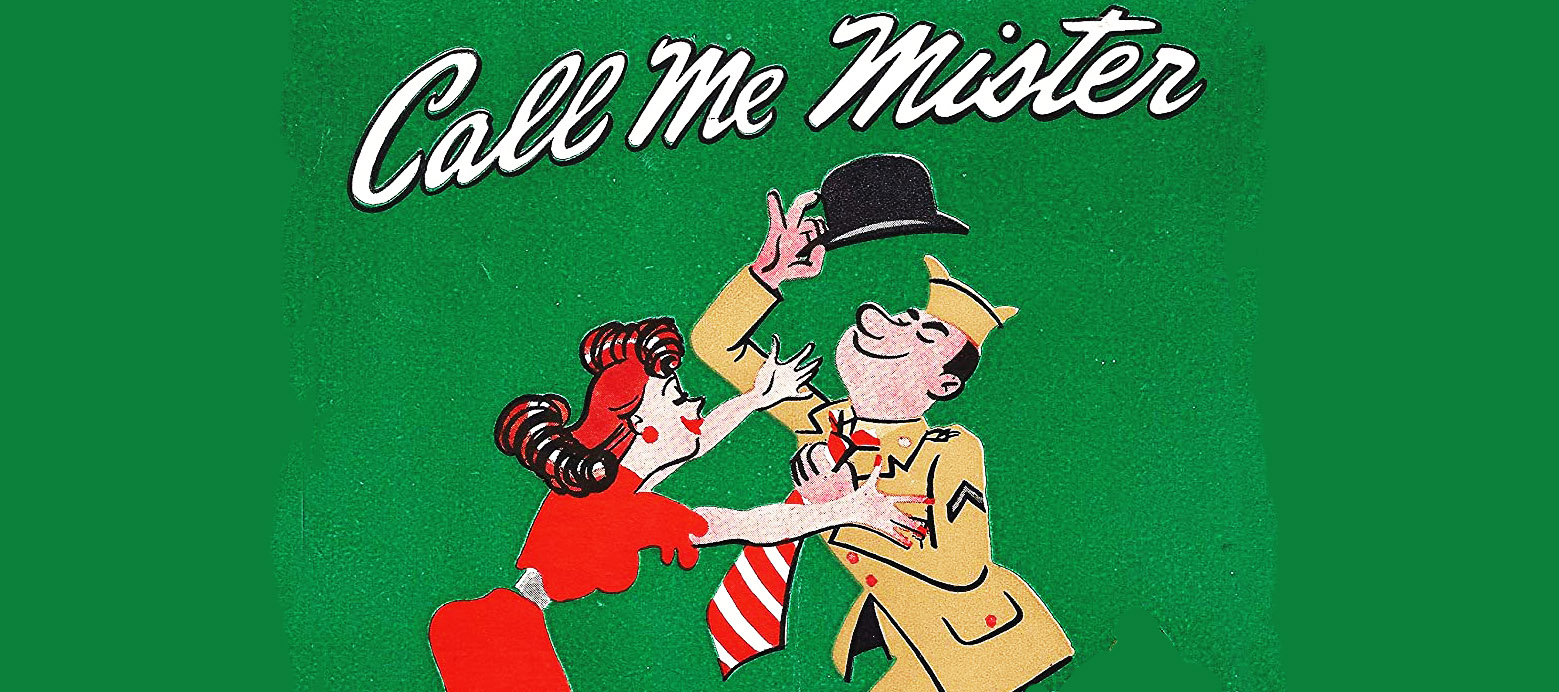
Musical
Musique: Harold Rome •
Paroles: Harold Rome •
Livret: Arnold M. Auerbach •
Production originale:
1 version mentionnée
Dispo: Résumé Génèse
Le titre fait référence aux troupes qui retournent heureusement à la vie civile et qui ne veulent plus être abordées par leurs rangs militaires.
Genèse: Le spectacle était sympathique et facile à vivre. Il n'y avait pas de grande thèse politique, à l'exception de quelques critiques des politiciens du Sud. En conséquence, la revue a été l’une des plus réussies de l’époque. Elle s'est jouée à Broadway pendant près de deux ans. Elle a proposé la chanson à succès «South America, Take It Away», a bénéficié d’un National Tour (avec des membres dans la distribution tels que Bob Fosse, Carl Reiner, Buddy Hackett, William Warfield, Jane Kean et Edmund Lyndeck). Un film en a même été tiré, même si le princicpal point commun entre le film et le spectacle à la scène est le titre. Une nouvelle intrigue a été créée et seules trois chansons ont été conservées de la production scénique.
Résumé: Tout au long des années de guerre, des spectacles tels que This Is the Army, Winged Victory, et Tars and Spars ont célébré et honoré les militaires américains en temps de guerre. Maintenant que la guerre était terminée, Call Me Mister a décidé de regarder l’Amérique d’après-guerre à travers le prisme d’anciens militaires qui sont de retour à la maison et de s’adapter à la vie civile.
Création: 18/4/1946 - Nederlander Theatre (Broadway) - 734 représ.
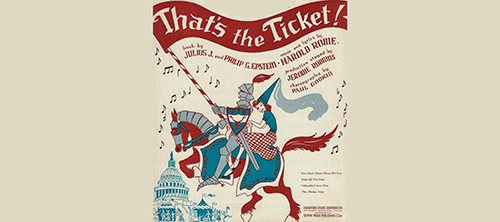
Musical
Musique: Harold Rome •
Paroles: Harold Rome •
Livret: Julius J. Epstein • Philip G. Epstein •
Production originale:
1 version mentionnée
Dispo: Résumé Commentaire Génèse Liste chansons
L’ambitieuse satire politique That’s the Ticket! a fermé prématurément lors de son Try-Out à Philadelphia. La partition était de Harold Rome, qui avait récemment écrit la partition pour la revue à succès Call Me Mister, le livret était de Julius J. et Philip G. Epstein (qui avec Howard Koch avait écrit le scénario de Casablanca), Jerome Robbins a mis en scène le spectacle. Mais That’s the Ticket! s’est effondré après seulement une semaine de représentation en Try-Out («closed on the road»), perdant environ 215.000$, et a disparu pendant plus de cinquante ans.
Genèse: Closed on the road à Philadelphia
Résumé: Cette satire nous décrit les démocrates et les républicains qui, pour la première fois dans l’histoire partagent une cause commune, leur aversion pour les deux autres grands partis politiques, dont l’un est connu comme les Féodaux. Une nuit à Central Park, Patricia (Edna Skinner), la fille du chef du Parti féodal Robert Vale-Waterhouse (Loring Smith), rencontre un chevalier qui avait été transformé en grenouille et qui est maintenant à nouveau redevenu un chevalier. Alfred, seigneur de Nottingham, aussi connu sous le nom d’Alfred le Moyen (Leif Erickson), et Patricia tombent immédiatement amoureux, et Robert décide qu’il a trouvé le candidat parfait pour se présenter à la présidence. Pendant ce temps, la sorcière Marcia LaRue (Kaye Ballard) qui est à l’origine de la malédiction de la grenouille jetée sur Alfred, est maintenant une célèbre star hollywoodienne et elle est déterminée à devenir la première femme présidente. Les démocrates et les républicains s’unissent et deviennent les républicrates avec Marcia pour candidate contre Alfred. Marcia fait d’Alfred une grenouille, mais finalement tous ses pouvoirs lui font défaut et Alfred est élu président.
Création: 24/9/1948 - Shubert Theatre (Philadelphia) - 0 représ.
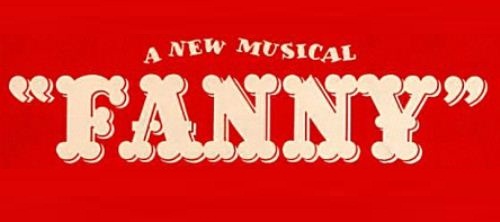
Musical
Musique: Harold Rome •
Paroles: Harold Rome •
Livret: Joshua Logan • S. N. Behrman •
Production originale:
0 version mentionnée
Dispo: Résumé Génèse Liste chansons
Genèse: The Broadway production opened at the Majestic Theatre on November 4, 1954, transferred to the Belasco Theatre on December 4, 1954 and closed on December 16, 1956 after a total run of 888 performances. Directed by Logan and choreographed by Helen Tamiris, the original cast included Florence Henderson as Fanny, Ezio Pinza as Cesar, William Tabbert as Marius, and Walter Slezak as Panisse. Scenic and lighting design were by Jo Mielziner. Slezak won the Tony Award for Best Performance by a Leading Actor in a Musical. The West End production opened at the Drury Lane Theatre in 1956. The cast included Robert Morley, Kevin Kevin Scott, and Janet Pavek. The Goodspeed Opera House in East Haddam, Connecticut produced the musical in 1986 with Chester Ludgin as Cesar, David Hurst as Panisse, and Karen Culliver as Fanny. The Paper Mill Playhouse in Milburn, New Jersey produced Fanny in 1990. Directed by Robert Johanson, the cast featured George S. Irving as Panisse, José Ferrer as Cesar, and Teri Bibb as Fanny. 42nd Street Moon[1] in San Francisco, California presented a concert version of "Fanny" in September 1997, as the fourth show in its Lost Musical Series 1997 "Composer-Lyricist Festival," celebrating five great Broadway composers who also wrote their own lyrics. The cast featured Caroline Altman as Fanny, Kelly Houston as Cesar, Pierce Peter Brandt as Marius, Darren Criss as Fanny's son (in his first professional acting role), Cesario and Lucinda Hitchcock-Cone as Honorine, Fanny's mother. The "Lost Musicals" Series presented Fanny at the Lilian Baylis Theatre, Sadler's Wells, London in 2005. Encores! presented a staged concert at City Center from February 4, 2010 to February 7. The director was Mark Bruni, choreography by Lorin Latarro, with a cast that featured Elena Shaddow (Fanny), Fred Applegate (Panisse), George Hearn (Cesar), David Patrick Kelly (The Admiral), Priscilla Lopez (Honorine), Michael McCormick (Escartifique), James Snyder (Marius) and Ted Sutherland (Cesario). The production received mixed reviews.
Résumé: The teen-age love of Marius and Fanny has matured under the rueful guidance and encouragement of Cesar, Marius' arrogant yet appealing tavern-keeper father. Fanny loves Marius with all her heart, but he cannot fully accept her devotion. He is continually torn between his yearning for Fanny, his duty as an only son, and adventure calling him to sea. Marius gives in to the mystery of the sea and signs for a five-year voyage. His father disowns him, but Fanny bravely gives in to her rival. In the passion of their goodbye Marius almost changes his mind. However, Fanny sends him on his way, knowing it is the only way to save their love. Soon thereafter Fanny discovers she is to bear a child. Panisse, an older man and wealthy sail maker, has made previous marriage proposals to Fanny. In desperation she turns to him, and they are married. Having suspected the situation all along, Panisse is delighted at the prospect of the child's arrival. Convinced it will be a boy, Panisse digs out letters to make his shop-front sign read "& Son." Cesar and Panisse, dedicated old-world (often fiery) friends, band together to see to the boy's upbringing. On Cesario's first birthday, Marius returns and attempts to claim both Fanny and his son. Fanny finds it difficult to spurn her lover once more, but Cesar discovers them and drives him off. It is twelve years later. Like his true father before him, Cesario yearns for the sea and runs away to join Marius. This proves to be a final blow to an ageing and ill Panisse. Marius returns the boy to the Panisse home. The final moments are happy, and Panisse's dying wish is that Fanny and Marius be reunited.
Création: 4/11/1954 - Majestic Theatre (Broadway) - 888 représ.
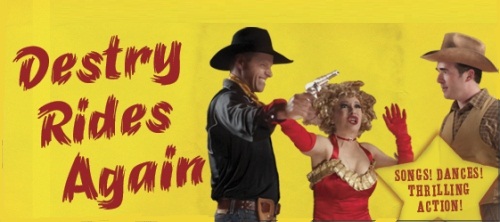
Musical
Musique: Harold Rome •
Paroles: Harold Rome •
Livret: Leonard Gershe •
Production originale:
4 versions mentionnées
Dispo: Résumé Génèse Isnpiration Liste chansons
Genèse: The show opened on Broadway at the Imperial Theatre on February 23, 1959 and closed on June 18, 1960 after 472 performances. Michael Kidd was the director and choreograper. The cast starred Andy Griffith as Destry and Dolores Gray as Frenchy.
Résumé: A sheriff who would prefer not to shoot a gun is compelled to use one by a criminal on the loose in the vice-ridden Western town he’s sent to run, in Harold Rome and Leonard Gershe’s musical adaptation of the much-filmed story.
Création: 23/4/1959 - Imperial Theatre (Broadway) - représ.

Musical
Musique: Harold Rome •
Paroles: Harold Rome •
Livret: Jerome Weidman •
Production originale:
4 versions mentionnées
Dispo: Résumé Génèse Liste chansons
Genèse: In the album Just For the Record..., Streisand recalls, "My first audition for the show was on the morning after Thanksgiving in 1961. Since the action took place in the 1930s, I showed up in a '30s fur coat that I'd bought in a thrift shop for $10. I sang three songs, including my new standby "A Sleepin' Bee". They asked me to come back and gave me "Miss Marmelstein" to learn for my second audition a few hours later." Harold Rome said, "The 'Miss Marmelstein' number was written before the casting of Barbra Streisand in the role, but her part was then enlarged. Somebody is that good ... you try to use them as much as possible." Productions [edit]The musical premiered on Broadway at the Shubert Theatre on March 22, 1962. Directed by Arthur Laurents and choreographed by Herbert Ross, it starred Elliott Gould as Harry Bogen. In addition to Streisand in the small role of Bogen's secretary, Miss Marmelstein, the supporting cast included Lillian Roth as Mrs. Bogen and Marilyn Cooper as Ruthie Rivkin, with Harold Lang, Bambi Linn, Ken LeRoy, and Sheree North. On October 1, it transferred to The Broadway Theatre, where it closed on December 9 after a total run of two previews and 300 performances. Gould and Streisand later married and divorced. In 1991, the American Jewish Theatre staged a revival directed and choreographed by Richard Sabellico. The production starred Evan Pappas as Bogen, Carolee Carmello as Ruthie, Jim Brachitta as Teddy, and Vicki Lewis as Miss Marmelstein. It was nominated for the Outer Critics Circle Award as Best Revival, and Best Actor in a Musical for Pappas. In 2002, Arcola Theatre in London, a former clothes factory, produced the show for its second anniversary. The director was Mehmet Ergen with co-director William Galinsky.
Résumé: Harry Bogen is an ambitious, unscrupulous young businessman in the 1930s New York City garment industry. He will stop at nothing to get to the top: he lies to his mother and girlfriend, Ruthie Rivkin, who try to help him become a better person, but he embezzles company funds from Apex Modes and betrays his friends and partners. Harry leaves Ruthie to take up with Martha Mills, a dancer in Club Rio Rhumba, but when he loses his friends and goes bankrupt, his mother and Ruthie stand by him.
Création: 22/3/1962 - Shubert Theatre (Broadway) - représ.

.png)
.png)





